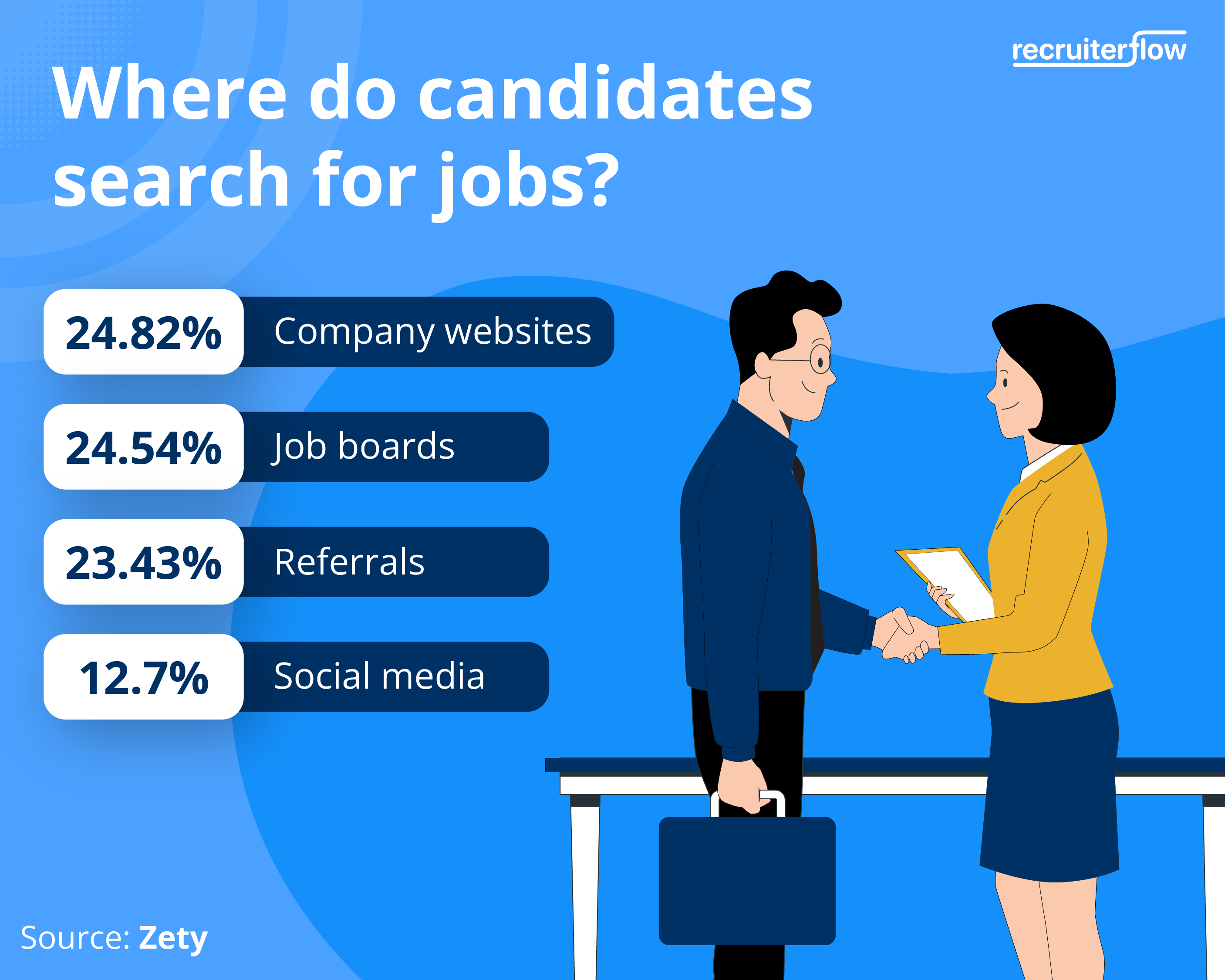
16 Recruiting Skills to Excel in 2026

Being a recruiter demands developing new recruiting skills and staying ahead of the curve!
As recruiting is evolving and the competition for hiring top talent is increasing, you need to know how to connect the right people with the right job (before your competitor does!).
Let’s explore 16 recruiting skills to add to your toolkit to up your recruiting game and stand out among your competitors.
Hard skills for recruiters
Hard skills are the technical abilities recruiters need to navigate the complexities of hiring processes with precision and efficiency.
1. Candidate sourcing skills
Candidate sourcing isn’t just about scouring candidates in job portals. You have a plethora of channels to source candidates from!
According to a survey of around 1000 Americans, candidates look for jobs in multiple channels, including:
- Company websites (24.82%)
- Job boards (24.54%)
- Referrals (23.43%)
- Social media (12.7%)

So, instead of waiting for candidates to apply for a job, you source them from different channels and reach out to them. The best part: you can also target passive candidates who may not be looking for a change but might consider your offer.
To poach the best candidates before your competitor does, develop a keen eye to spot talent in unconventional platforms and sources such as:
- Networking events and communities
- Word of mouth from your existing network
- Your recruiting database of passive candidates
- Leverage communities and forums like Superpath, ContentUK and Reddit
Also read: Recruitment vs talent acquisition
2. Context switching
Recruiters generally have a lot on their plates. One minute they’re sourcing candidates for a given role, and the next minute, they’re extending an offer to a candidate selected for another role.
In an environment like this, you need to be able to juggle multiple tasks and manage context-switching effectively.
“Planning is everything. For productivity and accuracy. However, leave enough room and flex spots for the unexpected. Recruitment like any profession can have surprises, twists and turns.”
– Darrell Clack, Recruiter
Here’s how successful recruiters manage context-switching like a pro:
- Assess the scope, priority and impact of your daily tasks, and rank your projects based on these metrics.
- Plan your schedule and allocate your time for each task—keep some slots open for ad-hoc requirements.
- Know when to delegate and seek help to share the workload. Automate repetitive or low-impact tasks such as interview scheduling, candidate or client communications and more using recruitment software.
- Prioritize quality over quantity, even if it requires you to churn a few tasks off your list.
3. Inbound marketing
Inbound marketing refers to drawing recruiters to your recruiting business via content marketing, social media marketing, and search engine optimization rather than the other way around.
About 46% of recruiters see a large portion of their jobs from a marketing perspective, which gives them an advantage over those overseeing it.
To attract your ideal candidates for a role, you must be adept with recruiter marketing strategies, including:
- Building a brand for your agency or business by highlighting company culture, values and mission in your marketing materials.
- Crafting engaging job descriptions that compel candidates to apply.
- Creating content for your social media, website, and other marketing channels to enhance your searchability and brand presence.
- Building a pipeline of past and passive candidates by nurturing them over time and offering valuable information about the company and its job opportunities.
Also, check our blog on recruitment strategies to attract the best talent.
4. Sales knowledge
“Recruiting talent is no different than any other challenge a startup faces. It’s all about selling.“
– Vivek Wadhwa, Indian-American Entrepreneur
A big part of recruiting involves engaging, persuading, and negotiating with candidates and clients to get them on board.
In some ways, a recruiter and a salesperson are not much different; both are constantly generating leads for their business and selling the right person on a product (in this case, the company and job are what they’re selling).
Here’s what makes a recruiter a great salesperson:
- Resilience: Hearing “no” or being ignored is quite common when you’re selling on something. You must develop a thick skin and take these challenges as opportunities to improvise.
- People management: In the people’s market i.e. recruitment, it’s important to understand their needs, and goals to serve them right. You also need to learn how to manage your client’s expectations and handle their requirements easily.
- Building trust: It all stands on trust! You need to project traits that people (candidates and clients) can trust and feel comfortable around. It all boils down to how to handle their objections and assure them during the process.
- Negotiating skills: Negotiating is an important recruiting skill that a salesperson must know of. From negotiating job offers to negotiating rates with your clients, it’s a never-ending process for recruiters. Make sure you understand what the candidate or client desires and how you can maximize their satisfaction.
Also, read our blog on sourcing vs recruitment
5. Tech literacy
Recruitment technology is constantly evolving today and you need to stay on top of the latest innovations and know when to pivot and adopt!
For example, 62% of companies are planning to invest in AI recruiting technologies, which means you need to get on board with AI applications in your recruitment process too! Not adopting it might have a negative implication on your business and make you replaceable.
To begin with, ATS and CRM technologies are must-haves in your tech stack. From sourcing candidates to tracking their data, and maintaining relationships with candidates and clients, these recruitment tools help you streamline things and automate redundant tasks.
Also, check our blog about candidate sourcing tools.
6. Writing finesse
Writing is involved in many recruitment tasks, including:
- Job descriptions
- Client and candidate communication
- Onboarding materials
- Candidate assessment
- Social media and website content
- Interview Questions
You should be able to express your business’ message with impact so it attracts a good readership. And like any other skill, you can master the skill of writing with practice.
- Set aside time each day to hone your writing skills—create sample writeups to improve your style and tone.
- Read a lot of content including books, articles, newsletters, or anything you find online, and observe how they express their intent and deliver the content in the right way. Try to emulate their style in your writing and pick up on small details.
- Take writing courses to learn how to write with flair and create impact with your words.
7. Data organizational skills
Siloed data is one of the biggest challenges for recruiters, especially as you grow big! The key is to think about structuring all this data to remove silos and foster communication within multiple functions of your recruiting business.
Being organized allows you to quickly access information and prioritize tasks effectively. It’s easier to track conversations and follow up with candidates and clients on the go.
More importantly, an organized recruitment process contributes to a positive candidate experience. You’ll be able to provide timely responses and foster smooth interactions, which can heavily impact their perception of your business.
Here’s how recruiters can stay organized:
- Keep your recruiting data organized using ATS, CRM, and project management tools.
- Create proper workflows, templates, and protocols for candidate sourcing, screening, and onboarding to ensure consistency and efficiency.
- Use to-do lists, and task calendars to identify high-priority recruitment activities. Make sure they align with recruitment goals and deadlines.
8. Networking
A recruiting business isn’t just about hiring candidates for your client! It’s also about building your presence in the market mainly in communities, forums, social media, or events.
Through networking, you can cultivate meaningful relationships with candidates, clients, industry professionals, and colleagues. You get access to a diverse pool of candidates and the chance to explore opportunities you may never find through conventional recruiting channels.
Here’s how recruiters can leverage networking:
- Attend industry conferences and recruiting events and mark your presence by speaking up
- Collaborate with industry influencers who can introduce you to a broader audience
- Engage with passive candidates on social platforms to build a rapport with them
10. Collaboration
Recruitment often involves multiple stakeholders like teammates, candidates, and hiring managers to oversee the entire recruitment process and ensure it aligns with the business objectives and strategies.
“Set a meeting with a hiring manager if you are working on a role for them and you have never worked together before. Get to know what they are looking for that is not on paper and also set the expectation of the recruiting flow. Establishing this all from the beginning will allow for smooth collaboration down the road.”
– Jennifer Marschang, Strategic Corporate Recruiter
Here’s what it takes to collaborate seamlessly with all the stakeholders:
- Keep everyone informed of progress, updates, and changes throughout the hiring process
- Invest time in getting to know their colleagues, and understanding their preferences, working styles, and objectives
- Encourage open dialogue, and seek input from diverse viewpoints
- Establish clear roles and responsibilities and establish a feedback process
- Use tools that facilitate collaboration such as project management tools or professional services automation, shared calendars, client portals, or creating a jira task to track and assign those updates.
Through collaborative hiring, you can enhance your chances of hiring candidates who seamlessly integrate into your company culture. It allows you to:
- Foster transparency in the hiring process
- Mitigate unconscious biases
- Expedite time-to-fill
- Develop a deeper insight into the candidate landscape
11. Outbound outreach
Outbound outreach is being proactively in touch with your passive candidates in an attempt to persuade them to take up your job offer down the line. Think of it as an opportunity to ignite the need to upskill or ‘high-meaning’ roles or projects in these candidates.
While 65% of US employees are satisfied with their jobs, only 20% are passionate about them. This is where you can present the open roles in your organization to meet their expectations, be it high–authority roles, flexible work benefits, better incomes, or more.
Here’s how outbound outreach usually works:
- Source candidates that perfectly match your job requirements, and their skills on their resumes align closely with the description of the role.
- Reach out to them with a personalized and thoughtful message with the intent to get in their loop, not sell
- Have a consistent line of communication with them and build a rapport with them to keep them informed of the company updates (even if they reject your offer)
- Follow up by persistently sharing stories from the organization and how the candidate will benefit from the role you’re offering
- Make your recruiting agency a brand they can trust to post content, engage with candidates, and share success stories from candidates you’ve successfully placed in organizations
Soft skills for recruiters
Soft skills are important for fostering meaningful connections with candidates and clients throughout the hiring journey.
12. Empathy
Show genuine interest in the challenges candidates face in their current roles with the intent of listening, not selling. Make sure you only offer them roles that are aligned with their goals and preferences.
13. Listening skills
Make sure to dig into your candidates’ viewpoints and listen to their thoughts and work process. Listen patiently before trying to come up with a solution.
14. Growth mindset
A recruiter should be coachable and adaptable to new skill requirements and technology. Keep updated with the new recruitment trends, actively network with fellow recruiters and industry leaders, and be out there to gain fresh perspectives about the industry.
15. Handling objections
Addressing candidate and client objections to ‘“Why should we choose you?” is one of the biggest recruitment skills to have today! Make sure to highlight your key achievements and best traits to get on their good books and seal the deal.
16. Phone manners and etiquette
Phone calls are a part of your day-to-day job description. Make sure every conversation counts and gets you a positive response from your candidates/clients.
Also read: Soft skills recruiters must have
Master these recruiting skills to hire the best candidates
Recruiters must wear multiple hats to navigate through the complex puzzle that is recruitment. From honing hard skills like sales and marketing to cultivating soft skills like empathy and communication, recruiters need a unique blend of abilities to succeed at their jobs.
So, embrace these recruiting skills, be adaptable to the changing requirements of the industry and stay curious!
Recruitment

